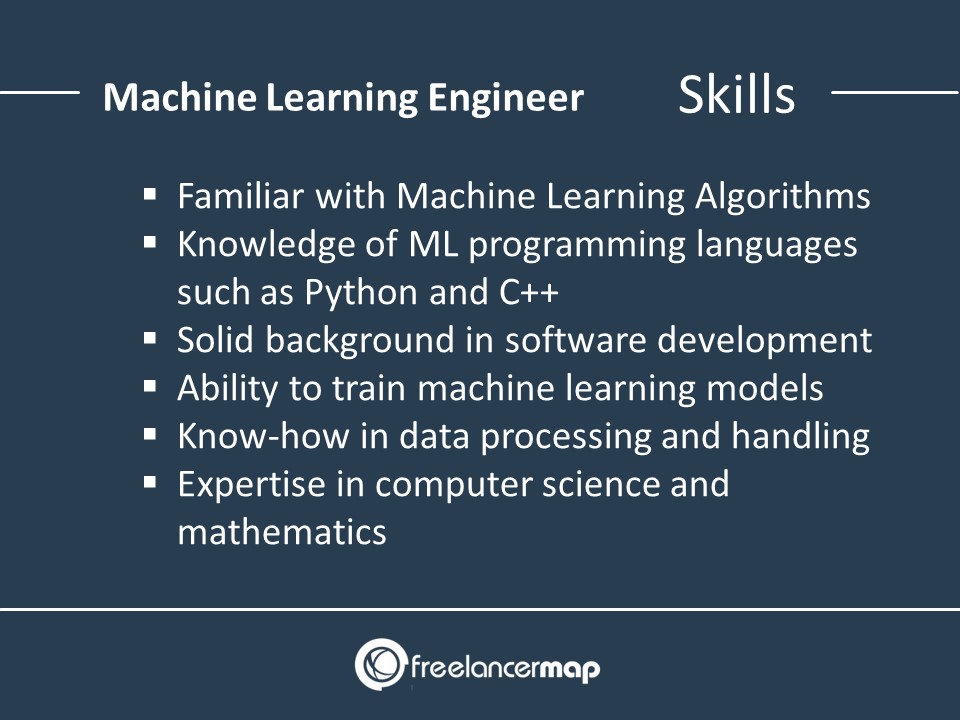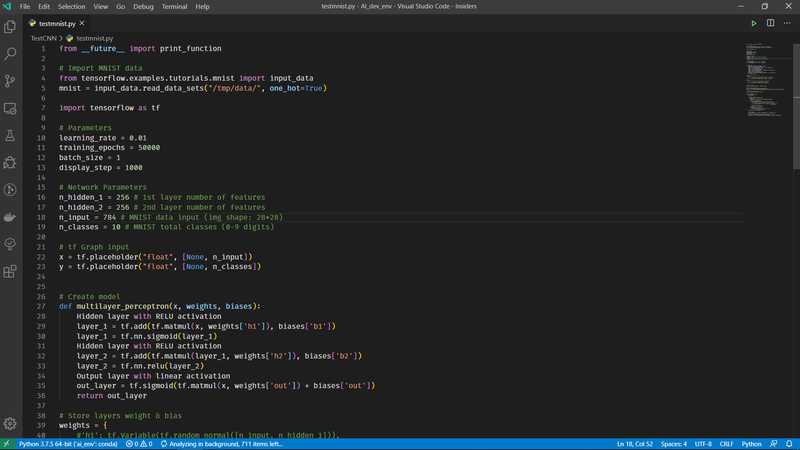All Categories
Featured
Table of Contents
On the various other hand, ML engineers concentrate on structure and releasing artificial intelligence designs. They concentrate on training versions with data to make forecasts or automate tasks. While there is overlap, AI engineers manage even more varied AI applications, while ML engineers have a narrower concentrate on device learning formulas and their useful implementation.
Machine discovering designers focus on creating and deploying artificial intelligence versions into production systems. They service engineering, ensuring designs are scalable, efficient, and incorporated into applications. On the other hand, information scientists have a wider function that consists of information collection, cleansing, expedition, and structure versions. They are usually in charge of drawing out insights and making data-driven choices.
As organizations progressively take on AI and device understanding technologies, the need for experienced specialists grows. Maker discovering engineers work on advanced projects, contribute to innovation, and have affordable salaries.
ML is basically different from standard software application development as it focuses on mentor computer systems to gain from data, instead of programming explicit policies that are executed methodically. Uncertainty of end results: You are probably utilized to creating code with predictable results, whether your function runs when or a thousand times. In ML, nonetheless, the end results are less specific.
Pre-training and fine-tuning: Exactly how these designs are trained on large datasets and then fine-tuned for details tasks. Applications of LLMs: Such as text generation, view evaluation and details search and retrieval.
A Biased View of How Long Does It Take To Learn “Machine Learning” From A ...
The capability to take care of codebases, merge modifications, and fix conflicts is equally as vital in ML advancement as it remains in typical software program projects. The abilities created in debugging and testing software applications are extremely transferable. While the context may transform from debugging application reasoning to recognizing problems in data handling or model training the underlying principles of organized examination, theory testing, and repetitive refinement are the same.
Equipment learning, at its core, is heavily reliant on statistics and probability theory. These are critical for comprehending just how algorithms gain from data, make predictions, and evaluate their efficiency. You need to consider coming to be comfy with concepts like analytical significance, distributions, hypothesis testing, and Bayesian reasoning in order to design and interpret designs efficiently.
For those curious about LLMs, a detailed understanding of deep knowing designs is valuable. This includes not only the auto mechanics of semantic networks yet additionally the architecture of particular models for different use situations, like CNNs (Convolutional Neural Networks) for picture processing and RNNs (Recurrent Neural Networks) and transformers for consecutive data and all-natural language handling.

You should understand these issues and learn methods for identifying, alleviating, and connecting concerning prejudice in ML models. This includes the potential effect of automated decisions and the honest ramifications. Many versions, especially LLMs, call for substantial computational sources that are commonly supplied by cloud systems like AWS, Google Cloud, and Azure.
Structure these abilities will not only assist in a successful change into ML but likewise make sure that designers can add successfully and properly to the advancement of this dynamic field. Concept is important, but absolutely nothing defeats hands-on experience. Begin working on tasks that allow you to apply what you've learned in a functional context.

Join competitions: Join platforms like Kaggle to participate in NLP competitions. Develop your projects: Beginning with easy applications, such as a chatbot or a message summarization tool, and gradually boost complexity. The field of ML and LLMs is swiftly developing, with new breakthroughs and innovations emerging on a regular basis. Staying updated with the most recent research study and fads is vital.
The Facts About Aws Certified Machine Learning Engineer – Associate Revealed
Join communities and online forums, such as Reddit's r/MachineLearning or area Slack channels, to discuss ideas and get advice. Participate in workshops, meetups, and meetings to link with various other specialists in the field. Contribute to open-source projects or write article about your learning trip and jobs. As you obtain expertise, begin trying to find opportunities to include ML and LLMs into your work, or seek new roles concentrated on these technologies.
Prospective usage instances in interactive software application, such as suggestion systems and automated decision-making. Comprehending uncertainty, basic analytical procedures, and probability distributions. Vectors, matrices, and their duty in ML algorithms. Error reduction strategies and gradient descent clarified simply. Terms like version, dataset, attributes, labels, training, inference, and validation. Information collection, preprocessing strategies, design training, analysis procedures, and deployment factors to consider.
Choice Trees and Random Woodlands: Intuitive and interpretable designs. Support Vector Machines: Optimum margin category. Matching problem types with proper designs. Balancing performance and complexity. Standard framework of semantic networks: neurons, layers, activation features. Split computation and forward proliferation. Feedforward Networks, Convolutional Neural Networks (CNNs), Persistent Neural Networks (RNNs). Photo recognition, series prediction, and time-series evaluation.
Information flow, transformation, and function engineering strategies. Scalability concepts and efficiency optimization. API-driven methods and microservices combination. Latency administration, scalability, and version control. Constant Integration/Continuous Deployment (CI/CD) for ML workflows. Version surveillance, versioning, and efficiency monitoring. Finding and dealing with changes in version efficiency with time. Dealing with performance traffic jams and source management.
Some Known Incorrect Statements About Why I Took A Machine Learning Course As A Software Engineer
Training course OverviewMachine knowing is the future for the future generation of software program experts. This course functions as an overview to artificial intelligence for software application engineers. You'll be presented to 3 of the most relevant parts of the AI/ML discipline; overseen understanding, semantic networks, and deep learning. You'll comprehend the distinctions between conventional programming and artificial intelligence by hands-on development in supervised understanding prior to constructing out intricate dispersed applications with neural networks.
This training course works as an overview to maker lear ... Show Much more.
The average ML workflow goes something similar to this: You require to recognize the service problem or purpose, before you can try and address it with Device Understanding. This frequently indicates study and collaboration with domain level professionals to define clear purposes and needs, in addition to with cross-functional teams, including data researchers, software application designers, product managers, and stakeholders.
: You choose the most effective design to fit your goal, and afterwards train it using libraries and frameworks like scikit-learn, TensorFlow, or PyTorch. Is this working? A fundamental part of ML is fine-tuning models to get the preferred outcome. So at this stage, you evaluate the efficiency of your picked machine discovering model and after that utilize fine-tune version parameters and hyperparameters to enhance its efficiency and generalization.
This may involve containerization, API advancement, and cloud release. Does it remain to function now that it's live? At this stage, you monitor the efficiency of your deployed models in real-time, identifying and attending to issues as they arise. This can additionally suggest that you upgrade and re-train versions frequently to adapt to changing data circulations or company demands.
An Unbiased View of How Long Does It Take To Learn “Machine Learning” From A ...

Equipment Learning has blown up over the last few years, thanks in component to advances in information storage, collection, and computing power. (Along with our need to automate all things!). The Equipment Discovering market is predicted to reach US$ 249.9 billion this year, and then remain to grow to $528.1 billion by 2030, so yeah the need is rather high.
That's just one task uploading website also, so there are even extra ML tasks out there! There's never ever been a far better time to obtain right into Device Understanding.
Right here's the important things, technology is just one of those sectors where a few of the most significant and ideal people in the world are all self taught, and some even freely oppose the concept of people getting a college degree. Mark Zuckerberg, Costs Gates and Steve Jobs all dropped out before they got their degrees.
More About Machine Learning Course - Learn Ml Course Online
As long as you can do the job they ask, that's all they really care about. Like any kind of new skill, there's definitely a discovering contour and it's going to really feel tough at times.
The main differences are: It pays remarkably well to most various other jobs And there's a recurring knowing component What I indicate by this is that with all tech roles, you need to stay on top of your game to make sure that you understand the existing skills and modifications in the market.
Kind of just how you might discover something brand-new in your existing job. A lot of individuals that work in tech actually enjoy this due to the fact that it suggests their job is always changing somewhat and they appreciate learning brand-new things.
I'm going to mention these skills so you have an idea of what's needed in the job. That being claimed, an excellent Artificial intelligence program will certainly instruct you nearly all of these at the same time, so no need to stress and anxiety. A few of it may even appear difficult, yet you'll see it's much less complex once you're using the concept.
Table of Contents
Latest Posts
A Comprehensive Guide To Preparing For A Software Engineering Interview
How To Explain Machine Learning Algorithms In Interviews
Google Software Engineer Interview Process – What To Expect In 2025
More
Latest Posts
A Comprehensive Guide To Preparing For A Software Engineering Interview
How To Explain Machine Learning Algorithms In Interviews
Google Software Engineer Interview Process – What To Expect In 2025